Siberian Dream

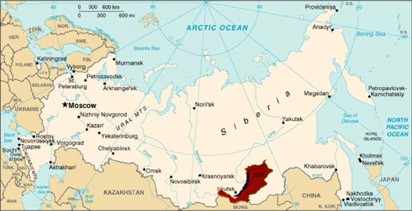


- Janet Gardner — Producer/Director
- Irina Pantaeva — Co-Producer/Writer
- Kevin Cloutier — Director of Photography/Field Producer
- Jessie Weiner — Editor
- Nicholas Brooke — Music Consultant
- Keith Yeager — Associate Producer
- Zelda Fazaeli Yanovich — Assistant Producer
Consultants
- Marlene Sanders, Department of Broadcast Journalism,
New York University - Dr. Robert Thurman,
Columbia University , President of Tibet House U.S. - Dr. David Foglesong, Department of History,
Rutgers University - Dr. Nicholas Brooke, Department of Music,
Bennington College
This film was made possible by a grant from the New Jersey Council for the Humanities, a state partner of the National Endowment for the Humanities. The views expressed in this film are those of the authors and do not necessarily reflect the views of the New Jersey Council for the Humanities or the National Endowment for the Humanities.
Additional funding provided by the Women in Film Foundation’s Film Finishing Fund, the New York Council for the Humanities, Barakat, Inc., Nomadic Expeditions, and Glue Editing and Design.
Photo Gallery
Quotes
"I just took a look at the film and was mesmerized by the story. This is truly original and inspiring."
Linden Chubin, Asia Society
"This wonderful project documenting Buryat history, culture, and religion, will be of great help for any and all people interested in better understanding the peoples of Russia and Central Asia."
Dr. Robert A.F. Thurman, President, Tibet House U.S.
Character Descriptions
 Irina Pantaeva tells the story of what it meant to grow up under Soviet rule, how her Buryat-Mongol language and culture were suppressed, and celebrates the cultural and religious revival now taking place.
Irina Pantaeva tells the story of what it meant to grow up under Soviet rule, how her Buryat-Mongol language and culture were suppressed, and celebrates the cultural and religious revival now taking place.
 Roland Levin is a Latvian emigre who fell in love with Irina, was separated from her, and the obstacles they struggled with before reuniting in America.
Roland Levin is a Latvian emigre who fell in love with Irina, was separated from her, and the obstacles they struggled with before reuniting in America.
 Ruslan, Irina’s son, travels back to Siberia with his mother to learn more about the history and culture of the Buryats. At home in New York, he studies and composes music while attending high school.
Ruslan, Irina’s son, travels back to Siberia with his mother to learn more about the history and culture of the Buryats. At home in New York, he studies and composes music while attending high school.
 Solongo is Irina and Roland’s newborn baby boy. In Buryat, Solongo means ‘rainbow.’ Though they live in New York, Irina is raising her children to be familiar with their culture and heritage.
Solongo is Irina and Roland’s newborn baby boy. In Buryat, Solongo means ‘rainbow.’ Though they live in New York, Irina is raising her children to be familiar with their culture and heritage.
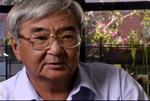 Vladlen Pantaeva, Irina’s father, describes the restrictions imposed upon artists during Soviet times. A composer in the Buryat National Theater, he looks forward to his grandson continuing their traditions through his music.
Vladlen Pantaeva, Irina’s father, describes the restrictions imposed upon artists during Soviet times. A composer in the Buryat National Theater, he looks forward to his grandson continuing their traditions through his music.
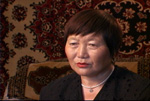 Tatyana Pantaeva, Irina’s mother, explains the tough times her family experienced after perestroika. During the Soviet years, she held two jobs in order to earn enough money to feed and clothe her family.
Tatyana Pantaeva, Irina’s mother, explains the tough times her family experienced after perestroika. During the Soviet years, she held two jobs in order to earn enough money to feed and clothe her family.
 Robert Thurman is Professor of Religion at Columbia University and President of Tibet House US. In Siberian Dream, he describes the struggle of the Buryats during Soviet rule and the integration of Buddhism into their culture.
Robert Thurman is Professor of Religion at Columbia University and President of Tibet House US. In Siberian Dream, he describes the struggle of the Buryats during Soviet rule and the integration of Buddhism into their culture.
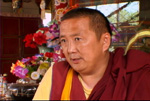 Buddhist monk, Gunchen Lama, recalls Stalin’s purges of Buddhist institutions and monks during the early days of the Soviet Union. Ivolginsk Datsan was the only monastery to survive, and it is here that he hopes to modernize his school.
Buddhist monk, Gunchen Lama, recalls Stalin’s purges of Buddhist institutions and monks during the early days of the Soviet Union. Ivolginsk Datsan was the only monastery to survive, and it is here that he hopes to modernize his school.
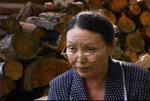 Dr. Lubov Abaeva describes the nomadic culture in the days before the Russians came into their territory. As professor of anthropology at Buryat State University, she has found new pride in Buryat culture among the younger generation.
Dr. Lubov Abaeva describes the nomadic culture in the days before the Russians came into their territory. As professor of anthropology at Buryat State University, she has found new pride in Buryat culture among the younger generation.
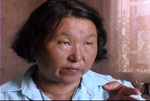 Nadja Stepanova, President of the National Society of Shamanism, performs a ritual in honor of Irina’s ancestors. She explains the significance of the ceremony and the importance of this ceremony for Irina and her family.
Nadja Stepanova, President of the National Society of Shamanism, performs a ritual in honor of Irina’s ancestors. She explains the significance of the ceremony and the importance of this ceremony for Irina and her family.
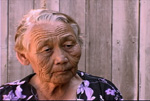 Elena Madueva, a farmer in the village of Korsakovo, relates her memories of the collective farms. She describes how, with the implementation of perestroika, they lost everything they had worked so hard for almost overnight.
Elena Madueva, a farmer in the village of Korsakovo, relates her memories of the collective farms. She describes how, with the implementation of perestroika, they lost everything they had worked so hard for almost overnight.
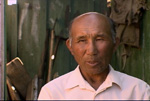 Alexandr Maduev, Elena’s husband, is a Shaman. He explains how Stalin rid Buryatia of Shamans and prohibited their religion. "We used to be poor," he says, "and we are still poor."
Alexandr Maduev, Elena’s husband, is a Shaman. He explains how Stalin rid Buryatia of Shamans and prohibited their religion. "We used to be poor," he says, "and we are still poor."
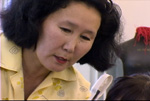 As a designer, Larissa Dagdanova chose Irina to model for her clothing collection when she was a schoolgirl. Under communism, fashion was seen as promoting capitalism. Today, she runs a thriving fasion house.
As a designer, Larissa Dagdanova chose Irina to model for her clothing collection when she was a schoolgirl. Under communism, fashion was seen as promoting capitalism. Today, she runs a thriving fasion house.
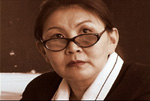 The teacher in Siberian Dream reflects Irina’s memories as a schoolgirl. Her conversation inside and outside the classroom represents just one of the many methods of Russification the Buryats were subjected to
The teacher in Siberian Dream reflects Irina’s memories as a schoolgirl. Her conversation inside and outside the classroom represents just one of the many methods of Russification the Buryats were subjected to
Purchase and Streaming Options
- Rent on Vimeo
- For personal DVD purchase, please contact The Gardner Documentary Group.
